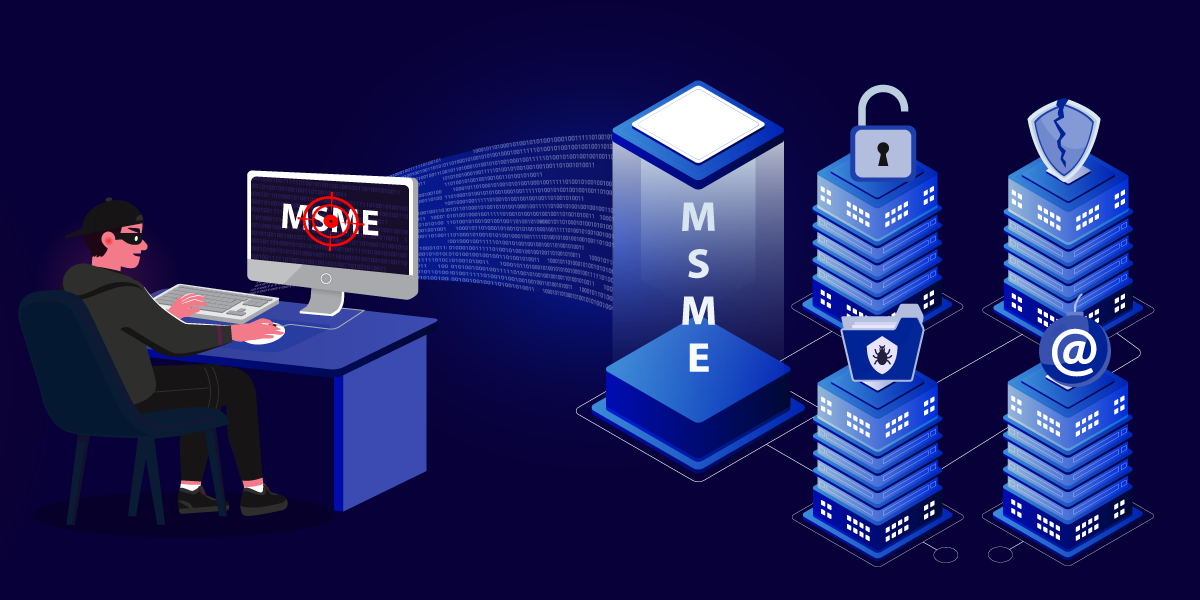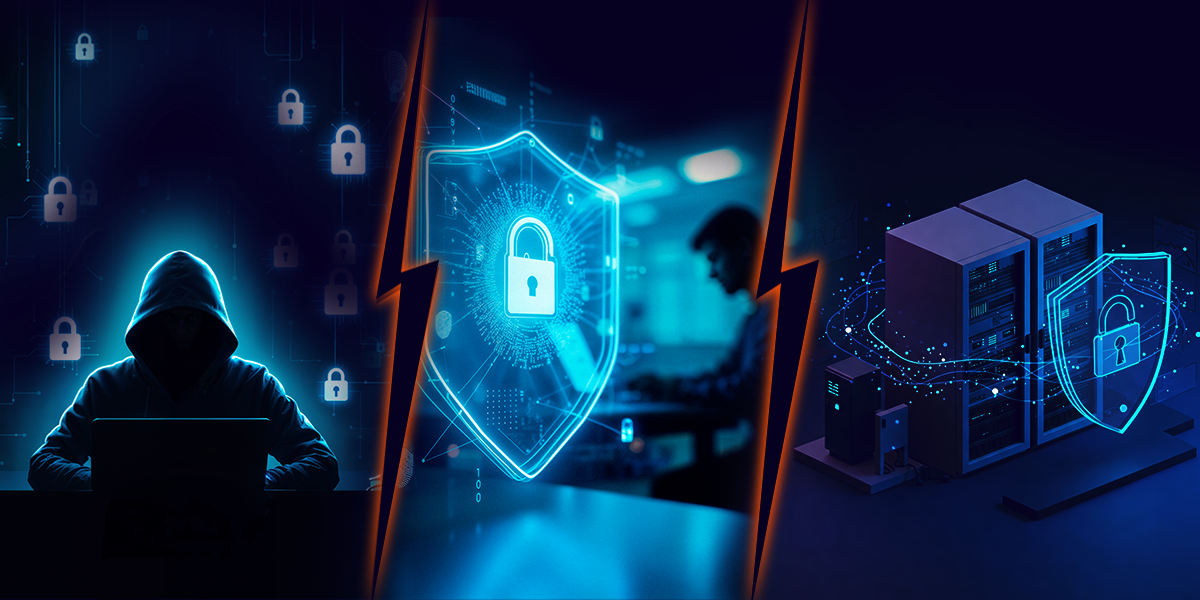For an extended period, Micro, Small, and Medium-sized Enterprises (MSMEs) have erroneously perceived themselves as being overlooked by cybercriminals, with a perception like why threat actors would expend time on MSMEs when billion-dollar corporations are readily available.
However, this misconception is resulting in substantial financial losses for businesses. Cyberattacks on MSMEs have experienced a meteoric rise, with severe repercussions such as financial ruin, data theft, and reputational damage. Consequently, it is imperative to investigate the reasons behind this surge in cyber threats against small businesses and identify the vulnerabilities that make them susceptible to exploitation. Furthermore, it is crucial to develop effective strategies for businesses to protect themselves from these threats.
This blog delves into the alarming increase in cyber threats against MSMEs, elucidates the critical vulnerabilities that businesses cannot afford to disregard, and provides actionable strategies for business owners to safeguard their organizations. While the risks are substantial, the solutions are equally viable.
Read More: How Phishing Combined with AI Is Skyrocketing Cyberattacks?
Why are small businesses considered the most attractive targets?
Cybercriminals perceive Micro, Small, and Medium-sized Enterprises (MSMEs) as attractive targets due to several factors:
- Weak Cybersecurity Defenses:
- Most MSMEs lack dedicated cybersecurity teams, advanced security tools, robust protocols, and comprehensive awareness programs.
- Unlike large corporations with robust defenses, MSMEs often rely on outdated software and minimal protection, making them vulnerable to hacking attempts.
- Limited Cybersecurity Budget:
- Cybersecurity investments can be expensive, and many MSMEs deprioritize security over business growth.
- With limited budgets, they often neglect essential security protocols such as firewalls, endpoint protection, and employee training, leaving them highly susceptible to cyber threats.
- Furthermore, outdated software, the absence of dedicated IT personnel with required exposure, and inadequate data backup strategies further compromise their defenses, rendering them vulnerable to cyberattacks.
- High-Value Data, Low Protection:
- Despite their smaller size, MSMEs handle valuable customer data, payment details, and financial records, often with intellectual properties with minimal safeguards.
- Cybercriminals exploit this data for identity theft, fraud, or even resale on the dark web.
- The Supply Chain Weak Link:
- Many MSMEs collaborate with larger enterprises, making them an ideal entry. Point for supply chain attacks.
- Threat actors breach small businesses to gain access to bigger, more lucrative targets.
- Cloud and Digital Vulnerabilities:
- Rapid adoption of cloud platforms, e-commerce, and remote work has increased MSMEs’ attack surface.
- Misconfigured cloud settings, weak authentication, and lack of encryption open the door to unauthorized access.
- Employee Vulnerability & Social Engineering:
- Lack of cybersecurity awareness among employees makes them easy targets for such deception-based attacks.
- Insider Threats & Human Error
Due to their limited workforce, MSMEs are more susceptible to insider threats, whether intentional (disgruntled employees) or unintentional (accidental data leaks). Without robust access controls, anyone can become an entry point for attackers.
Read More: The Perils Of Shadow AI: Hidden Artificial Intelligence Threats Lurking In Organizations
Enhancing MSME Security Posture: Implementing No-Nonsense Cybersecurity Measures
In today’s evolving threat landscape, MSMEs must adopt a proactive cybersecurity approach. Here’s how to strengthen defenses with practical, cost-effective solutions.
- Establish a Clear Cybersecurity Policy
A well-defined cybersecurity policy is the backbone of a strong security strategy. It should cover:
- Access Controls – Define who can access sensitive data.
- Data Protection – Set guidelines for encryption and backups.
- Incident Response – Outline steps for handling security breaches.
- Employee Training – Educate staff on cybersecurity best practices.
This ensures everyone in the organization understands their role in maintaining security.
- Regular Data Backups & Recovery Planning:
Ransomware attacks, among others, can cripple a business if data is not backed up regularly. Ensure that critical data is backed up both on-premises and in the cloud and have a clear, tested plan in place for recovering data in the event of an attack. This proactive approach can minimize downtime and financial losses.
- Cyber Awareness: The First Line of Defense for MSMEs
In the battle against cyber threats, technology alone isn’t enough—employees are the first and often the weakest line of defense. Many cyberattacks succeed not because of sophisticated hacking but due to human error—clicking on phishing links, using weak passwords, or falling for social engineering traps. Without proper cybersecurity awareness and training, MSME employees unknowingly open the doors to devastating breaches. Equipping teams with the right knowledge transforms them from security liabilities into proactive defenders. In an era where cybercriminals exploit the smallest gaps, continuous education isn’t optional—it’s a business imperative.
- Outsourcing Cybersecurity: A Smart Move for MSMEs
Cyber threats evolve fast, and for MSMEs, keeping up can be overwhelming. Outsourcing cybersecurity to trusted experts isn’t just cost-effective—it’s a game-changer.
By outsourcing cybersecurity, MSMEs can gain access to top-tier security professionals without the burden of maintaining an in-house team. This expertise allows businesses to focus on their core operations while ensuring that their cybersecurity measures are up-to-date and effective.
Outsourced cybersecurity teams provide 24/7 threat protection, ensuring that businesses are protected against cyberattacks at all times. This continuous monitoring and detection enable businesses to respond swiftly to any potential threats, minimizing the impact of cyber incidents.
Additionally, outsourcing cybersecurity allows businesses to access enterprise-grade security without the need for significant investments. Advanced tools and AI-driven protection are available to businesses, providing them with the necessary capabilities to safeguard their data and systems.
Furthermore, outsourcing cybersecurity helps businesses stay ahead of regulatory requirements such as the General Data Protection Regulation (GDPR), the Payment Card Industry Data Security Standard (PCI-DSS), and India’s Computer Emergency Response Team (CERT-In) guidelines. These regulations mandate cybersecurity best practices for businesses handling sensitive data, and outsourcing cybersecurity ensures that businesses comply with these requirements effectively.
Lastly, outsourcing cybersecurity helps businesses build stronger business resilience by minimizing downtime and implementing robust backup, recovery, and risk mitigation strategies. These strategies help businesses recover from cyber incidents quickly and effectively, ensuring that their operations continue uninterrupted.
- Invest in Multi-Factor Authentication (MFA):
- Passwords alone won’t cut it. MFA adds an extra layer of security by requiring a second verification step (e.g., implementing an Authenticator app like MS or Google Authenticator).
- Even if a password is compromised, MFA prevents unauthorized access.
- Responding to a Cyberattack: What to Do Immediately
Immediate Response Steps:
- Isolate Infected Systems: Disconnect affected devices from the network to prevent further spread of the attack.
- Contact Cybersecurity Professionals: Engage with experts who can assess the situation, contain the breach, and initiate remediation efforts.
- Notify Authorities: Depending on the severity of the attack, it may be necessary to report the incident to the appropriate authorities.
- Handling Ransomware Attacks:
When faced with a ransomware attack, organizations often encounter a critical decision: whether to pay the ransom or not. In most cases, paying the ransom is not advisable. It not only funds criminal activities but also does not guarantee the restoration of your data. Instead, rely on your backups and incident response plan to facilitate the recovery of your systems.
Notifying Affected Customers & Partners:
It is crucial to promptly notify affected customers and partners in the aftermath of a cyberattack.
A strong communication strategy should outline:
- What happened
- How are you mitigating the damage
- Steps taken to prevent future incidents
- Simple Yet Effective Security Practices for MSME Employees
- Think Before You Click:
The simplest and most effective defense against phishing and social engineering attacks is vigilance. Employees should be trained to scrutinize suspicious emails and messages before clicking on any links or downloading attachments. A healthy dose of skepticism can significantly prevent breaches.
- Use Strong Passwords & MFA:
Employees should adopt strong, unique passwords for each account and consider using password managers to manage them. Combining this with enforced multi-factor authenticators and password managers creates a robust barrier against unauthorized access.
- Secure Work Devices & Networks:
In the era of remote work, ensuring the security of work devices and networks is paramount. Employees should avoid using public Wi-Fi for work tasks and, if unavoidable, use a reliable virtual private network (VPN) to encrypt their connections. Regularly updating devices and promptly installing security patches can also help prevent vulnerabilities.
Read More: Cyber Warfare 2025: Rising Global Threats And Essential Safeguards
A Smarter Approach to Cybersecurity for MSMEs
Cybersecurity doesn’t have to be complex or expensive. Small, proactive steps can significantly safeguard businesses from digital threats. Many cyberattacks succeed due to overlooked vulnerabilities, human errors, and weak security practices. Prioritizing basic measures like employee training, strong authentication, regular system updates, and secure data handling reduces risk exposure. Shifting cybersecurity from a reactive cost burden to a strategic investment in business resilience protects data, employees, and customers from evolving threats while building trust and long-term success.











